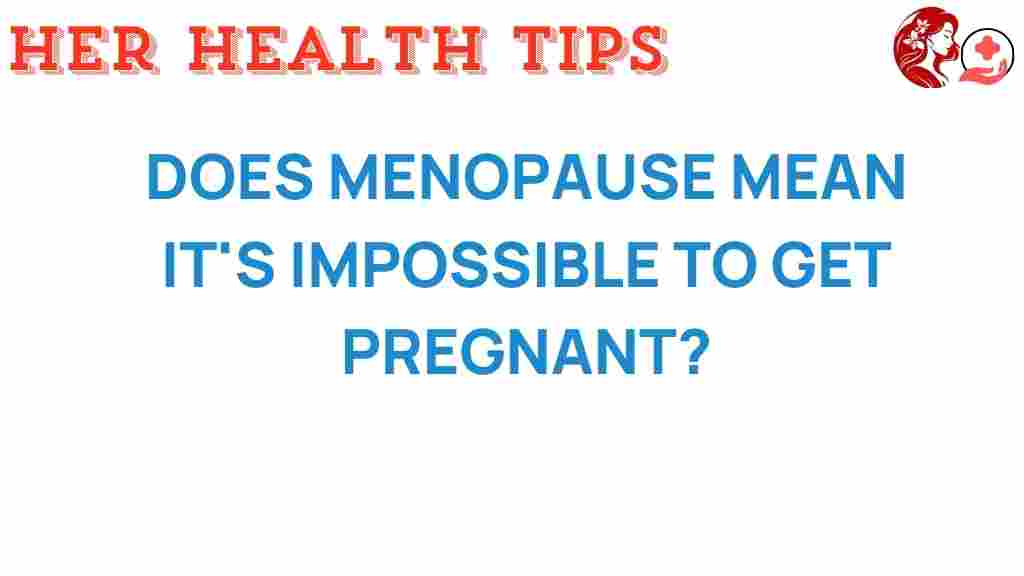Is Pregnancy Still Possible During Menopause? Unraveling the Myths
Menopause is a natural biological process that signifies the end of a woman’s reproductive years. It typically occurs between the ages of 45 and 55, as hormonal changes lead to the cessation of menstruation and fertility. However, there are many myths surrounding menopause, pregnancy, and reproductive health that can create confusion and concern among women. Many wonder: “Is pregnancy still possible during menopause?” This article aims to unravel these myths, providing clarity on the relationship between menopause and pregnancy while focusing on women’s health, hormonal changes, ovulation, and conception.
Understanding Menopause and Its Stages
Menopause is not a single event but a transitional phase that can be divided into three stages:
- Perimenopause: This is the transitional period leading up to menopause, often lasting several years. During perimenopause, women may experience irregular periods, hot flashes, and other hormonal changes.
- Menopause: This is officially diagnosed after 12 consecutive months without a menstrual period. The ovaries stop releasing eggs, and estrogen levels decrease significantly.
- Postmenopause: This stage begins after menopause and lasts for the rest of a woman’s life. The risk of certain health issues may increase during this time due to lower hormone levels.
Can You Get Pregnant During Menopause?
While the chances of conceiving decrease significantly as a woman approaches menopause, it is still possible to become pregnant during the perimenopausal stage. This is due to the fact that ovulation can still occur sporadically even when menstrual cycles become irregular.
Key Points on Fertility and Pregnancy During Menopause:
- Pregnancy is still possible until menopause is confirmed (12 months without a period).
- Irregular menstrual cycles can indicate ovulation is still occurring.
- Women in their 40s should use contraception if they do not wish to become pregnant.
The Role of Hormonal Changes
During menopause, the body undergoes significant hormonal changes, particularly in estrogen and progesterone levels. These hormones play a crucial role in regulating the menstrual cycle and ovulation. As levels fluctuate, women may experience:
- Hot flashes
- Night sweats
- Mood swings
- Changes in libido
- Vaginal dryness
These symptoms can impact a woman’s overall reproductive health and her ability to conceive. Understanding these hormonal changes is vital for women considering pregnancy during this period.
Myths About Pregnancy and Menopause
Several myths persist regarding pregnancy during menopause. Let’s debunk some of the most common ones:
- Myth 1: You cannot get pregnant after age 40.
Fact: While fertility does decline with age, women can still conceive in their 40s, particularly during perimenopause. - Myth 2: Menopause means you can’t get pregnant at all.
Fact: Pregnancy is impossible only after menopause is officially reached (12 months without a period). - Myth 3: Fertility treatments are not an option for women in menopause.
Fact: Some women may still pursue fertility treatments, such as IVF, using donor eggs.
Understanding Ovulation and Conception
To conceive, a woman must ovulate, releasing an egg that can be fertilized by sperm. During the perimenopausal stage, ovulation can become irregular, making it challenging to pinpoint fertile windows. Here’s what you should know:
- Tracking your menstrual cycle can help identify potential ovulation periods.
- Signs of ovulation include changes in cervical mucus and slight temperature increases.
- Using ovulation predictor kits can assist in determining fertile days.
Steps to Take If You Wish to Conceive During Menopause
If you are considering pregnancy during the perimenopausal stage, here are steps to take:
- Consult a Healthcare Professional: Discuss your reproductive health and any concerns regarding pregnancy at this stage.
- Understand Your Cycle: Keep track of your menstrual cycle and any ovulation symptoms.
- Consider Fertility Treatments: If natural conception proves difficult, explore fertility treatments with your doctor.
- Adopt a Healthy Lifestyle: Maintain a balanced diet, regular exercise, and manage stress to improve overall health and fertility.
- Use Contraception if Necessary: If you are not ready for pregnancy, consider birth control options until you reach menopause.
Potential Risks of Pregnancy During Menopause
While pregnancy is possible, there are several risks associated with conceiving later in life, including:
- Increased chance of miscarriage
- Higher risk of gestational diabetes
- Potential for chromosomal abnormalities in the baby
- Higher likelihood of cesarean delivery
It’s crucial to weigh these risks with a healthcare provider to make informed decisions regarding pregnancy during menopause.
Troubleshooting Tips for Women Considering Pregnancy
If you are facing challenges in conceiving during menopause, consider these troubleshooting tips:
- Seek Professional Guidance: Work with a fertility specialist to explore options.
- Optimize Your Health: Focus on nutrition, exercise, and mental well-being.
- Consider Counseling: Emotional support can be valuable during this journey.
- Explore Alternative Paths: Donor eggs or adoption may be a viable option if natural conception is not possible.
Conclusion
In conclusion, while menopause is a significant transition in a woman’s life that marks the end of natural fertility, pregnancy is still possible during the perimenopausal stage. Understanding the myths surrounding menopause, hormonal changes, ovulation, and conception is essential for women’s health. If you’re considering pregnancy during this time, consult with a healthcare professional to explore your options and ensure you make informed decisions. Remember, every woman’s experience with menopause is unique, and taking proactive steps can help navigate this complex phase of life.
For more information on women’s health topics, visit Women’s Health Resource. To learn more about menopause and fertility, check out this comprehensive guide.
This article is in the category Reproductive and created by HerHealthTips Team
